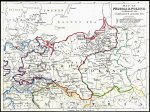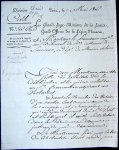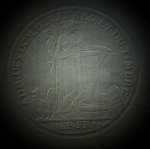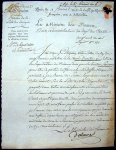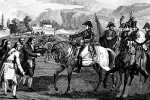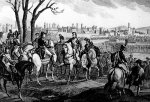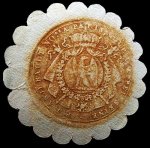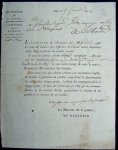Saalfeld
In December of 1805, Lannes was back in France. He spent the next months with his family and visited his old friends back in Lectoure. He cleared his mind of all things military, but knew that soon he would be called for yet another campaign.
The Prussians had remained neutral during the last campaign, but politics tend to ruin uneasy friendships. In July, Napoleon created the Confederation of the Rhine, and also initiated talks with the English over the possession of Hanover. With mounting pressure on the King of Prussia from within his inner circle, along with Prussian pride weighing heavily on his shoulders, war was declared on the 1st of October 1806.
Lannes was ordered by Napoleon to Schweinfurt where the 5th Corps was waiting to march on the Prussians. He would make up the advanced guard along with Augereau and his 7th Corps. Lannes moved out with Augereau a day behind, and reached Coberg on the 7th of October. After two days, Lannes left Coberg and reached Grafenthal with Suchet’s division. The Prussian advanced guard which was commanded by Prince Ferdinand was just miles away at Saalfeld.
In the morning hours the battle began with Suchet taking the brunt of the Prussian attack. The Prussians fought well but the French won the day after Lannes sent in a regiment of hussars, which sent the Prussians into a full retreat. Prince Ferdinand would be killed by one of the hussar’s while trying to rally his troops. When the Prussians heard the news of the defeat at Saalfeld, Hohenlohe moved his army towards Jena, while the King of Prussia moved to Weimar. Lannes marched after the Prussians and arrived at Jena on the 13th of October.
“My Cousin: I am displeased at your having entered Coburg
yesterday: your instructions were to occupy it this
morning, and in force.”
Napoleon to Lannes, October 8
THE TIMES OF LONDON
October 29, 1806
THE FIRST BULLETIN OF THE GRAND ARMY
Bamberg, Oct. 8
The peace with Russia, concluded and signed the 20th of July, and the negotiations with England which had begun and were nearly brought to maturity, had alarmed the Court of Berlin. The vague reports which had increased, and the consciousness of the injuries which had been done by this Cabinet to all the Powers whom it had successively betrayed, inclined it to attach credit to the reports that one of the secret articles of the Treaty concluded with Russia, gave Poland to the Prince CONSTANTINE, with the title of King; Silesia to Austria, in exchange for the Austrian part of Poland; and Hanover to England. It was then persuaded that those three Powers were in understanding with France, and that from such an understanding imminent danger would result to Prussia.
The injuries of Prussia towards France went back to very remote periods. She was the first who armed to take advantage of our intestine divisions. We afterwards saw her fly to arms, at the moment of invasion of Holland bay the Duke of York; and in the eventful period of the last war, although she had no cause of discontent with France, she armed again, and signed, on the 21st of October, 1805, that famous treaty of Potsdam, which was, a month after, replaced by the treaty of Vienna. She had injured Russia also, who could not forget the non-execution of the treaty of Potsdam and the conclusion of the subsequent treaty of Vienna. The injuries which she has committed against the Emperor of GERMANY and the Germanick body, are still more numerous and of longer date, and are universally known. She was always in opposition to the Diet. When the Germanick body was at war, she was at peace with its enemies. Her treaties with Austria were never executed; and her constant study was to excite the nations to war, that she might be able, at the moment of peace, to reap the fruits of her own address and of their successes. Those who should suppose that so much versatility proceeds from want of morality in the Prince, would be in a great mistake.
For fifteen years the Court of Berlin has been an arena, where different parties consend and triumph in their turns: one party wishes for war, and the other wishes for peace. The slightest political event, the most trifling incident, gives the ascendancy to one of those parties; and the KING, in the midst of the conflict of those opposing passions, in the labyrinth of intrigues, fluctuates in uncertainty, without ceasing for a moment to be an honest man. On the 11th of August a Courier from the Marquis LUCCHESINI arrived at Berlin, and brought, in the most positive terms, an assurance of those pretended dispositions, by which France and Russia were supposed to have agreed, in the Treaty of the 20th of July, to re-establish the kingdom of Poland, and to take Silesia from Prussia. The partizans of war immediately took fire: they did a violence to the personal feelings of the King: forty Couriers were dispatched in one night, and they flew to arms. The news of this sudden explosion reached Paris the 20th of the same month. It produced compassion for an Ally who had been so cruelly abused. Explanations and positive assurances were immediately given; and as a manifest error was the only cause of those unforeseen armaments, it was hoped that reflexion would calm an effervescence which had so little cause. The Treaty, however, which had been signed at Paris, was not ratified at St. Petersburgh; and documents of every sort proved to Prussia, that the Marquis LUCCHESINI had received his information in the most suspected circles, and from intriguers with whom he was in the habits of constantly associating. He was consequently recalled, and Baron DE KNOBELSDORFF was announced for his successor–a man of upright and frank character, and of the most perfect morality. This Envoy Extraordinary arrived shortly afterwards in Paris, and was the bearer of a letter from the Hing of PRUSSIA, dated the 23d of August.
This letter was filled with obliging expressions, and with pacifying declarations, and the EMPEROR replied to it with frankness, and in a manner to inspire confidence. The day after the Courier set out who was the bearer of this answer, the news arrived that songs outrageously insulting to France had been sung at the theatre of Berlin; that, immediately after the departure of M. KNOBELSDORFF, the armaments proceeded with redoubled activity; and that although all men possessed of common coolness must have been ashamed of this false alarm, yet nevertheless the war party, kindling discord all around had so turned the heads of all the people, that the KING found himself unable to oppose the torrent. From that time they began to understand at Paris, that the party for peace having been itself alarmed by lying assertions, and deceitful appearances, had lost its advantages; while the war party, profiting by the error which their adversaries had suffered themselves to be led, had added provocation to provocation, and accumulated insult on insult to such a point, that it was impossible to get out of such a situation but by war. The EMPEROR then saw that such was the force of circumstances, that he could not avoid taking up arms against his Ally: he ordered the preparations to be made. Everything went out on at Berlin with great rapidity. The Prussian troops entered Saxony, arrived on the frontiers of the Confederation, and insulted the advanced posts. On the 24th of September, the Imperial Guard left Paris for Bamberg, where it arrived on the 6th of October. Orders were expedited to the army, and every thing was in motion. On the 23d of September the EMPEROR quitted Paris; the 28th, he was at Mayence; the 2d of October, at Wurtsburgh, and the 6th at Bamberg. On the same day two carabine shots were fired by Prussian Hussars at a French officer of the staff. The two armies might then be conceived as in presence of each other.
The 7th, the EMPEROR received a Courier from Mentz, dispatched by the Prince of BENEVENTO. This Courier was the bearer of two important dispatches. The one was a letter from the King of PRUSSIA, of about twenty pages, which was, in reality, a bad pamphlet against France, in the style of those that the English Cabinet gets drawn up by those writers to whom they give 500 pounds per annum. The EMPEROR did not read it through, and said to the people who were about him, ‘I pity my brother the King of PRUSSIA: he does not understand French: he surely has never read this rhapsody.’ To this letter was joined the celebrated note of M. KNOBELSDORF. ‘Marshal,’ said the EMPEROR to Marshal BERTHIER, ‘they have given us a challenge: their rendezvous of honour is for the 8th: to such a rendezvous no Frenchman ever failed; but as they say that there is a beautiful Queen, who wishes to be a spectator of battles, let us be courteous and march for Saxony before we get to bed.’ The EMPEROR was right in his observation; for the Queen of PRUSSIA is at the army, in Amazon attire, wearing the uniform of her regiment of dragoons, writing twenty letters a day to stir up the flame on every side. It appears as if we saw Armida, in her madness, setting fire to her own palace: after her, there is Prince LOUIS of Prussia, a young Prince full of bravery and courage, stirred up by the party, and expecting to gain great reputation amidst the chances of war. After the example of those two great Personages, the whole Court cries out for war; but when the war shall have presented itself with all its horrors, every body will endeavour to excuse themselves from the guilt of it, and for having drawn the thunder bolt on the peaceful provinces of the North. Then, as a natural consequence of the inconsistencies of courses, we shall see the authors of the war, not only blaming it as an act of madness, excusing themselves from the charge of having provoked it, and saying that they wished it, indeed, but at another time; but we will also see them throwing the blame upon the KING, an honest man, whom they have made the dupe of their intrigues and artifices. The following are the dispositions of the French army. It is to march by three routes. The right, composed of the corps of Marshals SOULT and NEY, and of a division of Bavarian’s, marches from Amberg and Nuremburgh, is to unite at Bayeuth, and from thence advance upon Hoff, where it will arrive on the 9th. The center, composed of the Reserve of the Grand Duke of BERG, of the corps of the Marshal Prince of PONTE-CORVO, and of Marshal DAVOUST, and the Imperial Guards, marches by Bamberg to Cronach, will arrive on the 8th at Sallfburgh, and from thence will advance, by Saalburgh and Schleitz, upon Gera. The left, composed of the corps of Marshal LANNES and AUGEREAU, is to advance from Schweinfurth upon Coburg, Graffental, and Saalfeld.
“I have received, with great pleasure, the news of your action
on the 10th. I had heard the sound of guns and moved a
division in your direction to support you. The death of
Prince Louis of Prussia seems like a punishment of
Heaven, for he is the real author of the war.”
Napoleon to Lannes, October 10
THE TIMES OF LONDON
October 29, 1806
THE SECOND BULLETIN OF THE GRAND ARMY
Auma, Oct.12
The EMPEROR left Bamberg the 8th of October, at three o’clock in the morning, and arrived at Cronach by nine. His MAJESTY crossed the forest of Franconia at day break, on the 9th, and arrived at Ebersdorff, and from thence he repaired to Schleitz, where he was present at the first battle of the campaign. He returned to Ebersdorff, where he slept, and set out again on the 10th for Schleitz, and arrived on the 11th at Auma, where he slept, after having passed the day at Gera. All the orders of the EMPEROR have been perfectly well executed. Marshal SOULT advanced to Bayreuth on the 7th, and presented himself before Hoff on the 9th, carried away all the magazines of the enemy, made several prisoners, and advanced upon Planenon the 10th.
Marshal NEY followed his motions, at the distance of half a day’s march. On the 8th the Grand Duke of BERG advanced with the light Cavalry from Cronach to Saalburgh, having also with him the 25th regiment of Light Infantry. A Prussian regiment wished to defend the passage of the Saal: after a cannonade of half a hour, being threatened with being turned, it abandoned its positions and the Saal. On the 9th the Grand Duke of BERG advanced upon Schleitz: a Prussian General was there with 10,000 men. The EMPEROR arrived there at noon, and ordered the Marshal Prince of PONTE-CORVO, to attack and carry the village, as he wished to possess himself of it before the end of the day. The Marshal made his dispositions, put himself at the head of the columns, the village was carried, and the enemy pursued. If it had not been for the night, the greater part of this division would have been taken. General WATTIER, with the fourth regiment of Hussars, and the fifth regiment of Chaisseurs, made a charge of Cavalry against the Prussian regiments. Four companies of the 27th Light Infantry, being in the plain, were charged by some Prussian Hussars, but these soon saw how the French Infantry receives the Prussian Cavalry. Two hundred of the Prussian Cavalry remained upon the field of battle. General MAISONS commanded the Light Infantry. Colonel of the enemy was killed, two pieces of cannon were taken, 300 prisoners were made, and 400 killed. Our loss in men has been very small. The Prussian Infantry threw down their arms, and fled terrified before the French bayonets. The Grand Duke of BERG was in the midst of the charges which were made, sword in hand. On the 10th the Prince of PONTE-CORVO transferred his headquarters to Auma.
On the 11th the Grand Duke of BERG arrived at Gera. The General of Brigade, LASALLE, of the Cavalry of Reserve, routed the escort of the enemy’s baggage. Five hundred caissons and baggage-waggons were taken by the French Hussars. Our Light Cavalry is covered with gold. Pontoons and many other important articles composed part of this convoy. The left had equal success. Marshal LANNES entered Coburg on the 8th, and advanced on the 9th to Grassantbal. On the 10th he attacked at Saalfeld the advance guard of Prince HOHENHOLE, which was commanded by Prince LOUIS of Prussia, one of the champions of the war. The cannonade only lasted two hours: the half of General SUCHET’S division was all that charged. The Prussian Cavalry has been broken by the 9th and 10th regiments of Hussars. The Prussian infantry has not been able to preserve any order in their retreat; part of them have been driven into a morass, and part of them dispersed in the woods. We have made 1,000 prisoners, 600 remained on the field of battle: 30 pieces of cannon have been taken by our army. Seeing his people routed in this manner, Prince LOUIS of PRUSSIA, like a brave and loyal soldier, engaged hand to hand with a Marechal de LOGIS of the 10th regiment of Hussars. ‘Yield, Colonel,’ said the Hussar, ‘or you are dead.’ The PRINCE answered by a stroke of his sabre, the Marechal de LOGIS returned it with the point of his sword, and the PRINCE fell dead. If the last moments of his life have been those of a bad citizen, his death was however glorious, and worthy of regret. He died as every good soldier would wish to die. Two of his Aides-de-Camp have been killed at his side. Letters from Berlin were found upon him, which shew that the plan of the enemy was to attack immediately, and that the war party, at the head of which was the young PRINCE and the QUEEN, always feared that the pacific disposition of the KING, and his love for his subjects, might induce him to adopt more moderate measures, and disappoint her cruel hopes. It may be said that one of the first strokes of the war killed one of its authors. Neither Dresden nor Berlin are covered by any army. Ruined on the left, and taken at the moment that it was employed in forming the most hazardous combinations, the Prussian army finds itself, at its very debut, in a situation sufficiently critical. It occupies Eisenach, Gotha, Erfurt, and Weimar. The French army occupies Saalfeld and Gera, and marches upon Naumburgh and Jena. Flying parties of the French army inundate the plain of Leipzick. All the intercepted letters represent the Council of the King as torn by different opinions, always deliberating and never agreeing. Uncertainty, alarm, and terror, appear to have already succeeded to arrogance, thoughtlessness, and madness. Yesterday, the 11th, in passing at Gera before the 27th regiment of Light Infantry, the EMPEROR desired the Colonel to express his satisfaction to that regiment for their good conduct. In all these battles we leave no Officer of distinction to regret. The highest in rank is Captain CAMPOBASSO, of the 27th regiment of Light Infantry, a brave and loyal Officer. Our loss has not amounted to 40 killed and 60 wounded.
THE TIMES OF LONDON
October 29, 1806
THE THIRD BULLETIN OF THE GRAND ARMY
Gerau, Oct. 13
The battle of Schlietz, with which the campaign opened, and which has been very fatal to the Prussians, and that of Saalfeld, which followed on the next day, have spread consternation among the enemy. All the intercepted letters say, there was much alarm at Erfurt, where the KING, the QUEEN, the Duke of BRUNSWICK, &c. were consulting upon the measures that should be taken, without being able to agree.
But while they are deliberating, the French army continues its march. To this spirit of effervescent and excessive boasting, critical observations begin to succeed upon the inutility of the war; the injustice of breaking with France; the impossibility of being assisted; the disaffection of the soldiery, upon what they have not done, together with a thousand other observations which are always in the mouths of the multitude, when Princes are weak enough to consult them upon matters of great political interest which are above their reach. However, on the evening of the 12th, the focas of the French army were at Leipsic; the headquarters of the Grand Duke of BERG, are between Zeist and Leipsic; those of the Prince of PONTE-CORVO at Zeist; the Imperial Head-quarters at Gerau, with the Imperial guards and the corps of the Army under Marshal SOULT, are at Gerau: Marshal NEY’S corps is at Neustadt. In the first line is the corps of the army under Marshal DAVOUST at Naumburg: that of Marshal LANNES is at Jena, Marshal AUGEREAU at Kala. Prince JEROME, to whom the EMPEROR had confided the command of the Allies, and of a corps of Bavarians, has arrived at Schleitz, after having blockaded the fort of Cuhenbach with one of his regiments. The enemy, cut off from Dresden, was still at Erfurt on the 11th, and endeavouring to collect his columns that he had sent towards Cassel and Wurtzburg to act upon the offensive, wishing to open the campaign by an invasion of Germany. The Weser, upon which the enemy raised batteries, the Saal, which he also made a shew of defending, and the other rivers, are all turned much in the same manner as was practiced upon the Iller last year; so that the French army line the Banks of the Saal, with their rear towards the Elbe, at the same time they are marching against the Prussian army, which has its rear towards the Rhine; a position so whimsical cannot fail in producing events of great importance. The weather, since we commenced the present campaign, has been excellent, the country plentiful, and the soldiers full of vigour and health. We make matches of ten leagues without having a single straggler; and never was the army in a finer condition. However, the King of PRUSSIA’S intentions have been carried into effect: he wished that the French Army should evacuate the territory of the Confederation on the 8th of October, and they have evacuated it, but instead of repassing the Rhine, they have passed the Saal.
Sources
THE EMPEROR’S FRIEND – Marshal Jean Lannes
by Margaret Scott Chrisawn
IMPERIAL GLORY – The Bulletins of Napoleon’s Grand Armée 1805-1814
by J. David Markham
IN THE WORDS OF NAPOLEON – The Emperor Day by Day
Edited by R. M. Johnston – New Material by Philip J. Haythornthwaite
FASTES DE LA NATION FRANCAISE – 1825 Edition
by Ternisien D’Haudricourt
ATLAS to Jomini’s Life of Napoleon
